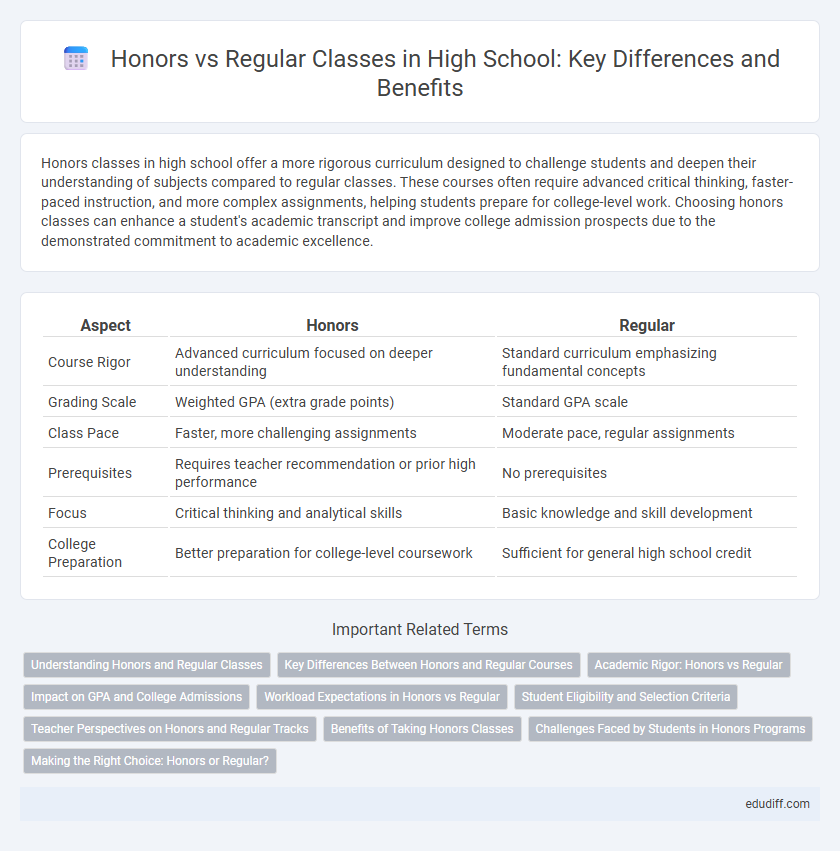Honors classes in high school offer a more rigorous curriculum designed to challenge students and deepen their understanding of subjects compared to regular classes. These courses often require advanced critical thinking, faster-paced instruction, and more complex assignments, helping students prepare for college-level work. Choosing honors classes can enhance a student's academic transcript and improve college admission prospects due to the demonstrated commitment to academic excellence.
Table of Comparison
| Aspect | Honors | Regular |
|---|---|---|
| Course Rigor | Advanced curriculum focused on deeper understanding | Standard curriculum emphasizing fundamental concepts |
| Grading Scale | Weighted GPA (extra grade points) | Standard GPA scale |
| Class Pace | Faster, more challenging assignments | Moderate pace, regular assignments |
| Prerequisites | Requires teacher recommendation or prior high performance | No prerequisites |
| Focus | Critical thinking and analytical skills | Basic knowledge and skill development |
| College Preparation | Better preparation for college-level coursework | Sufficient for general high school credit |
Understanding Honors and Regular Classes
Honors classes in high school offer a more rigorous curriculum designed to challenge students with advanced content and faster pacing compared to regular classes. These courses often require deeper critical thinking, complex problem-solving skills, and extensive reading or projects, preparing students for college-level work. Regular classes provide a solid foundation in core subjects with a balanced workload suited for a broad range of learners, emphasizing mastery of essential concepts and steady academic progress.
Key Differences Between Honors and Regular Courses
Honors courses in high school offer a more rigorous curriculum with advanced content, faster pacing, and higher expectations compared to regular courses. These classes often require critical thinking, in-depth analysis, and extensive homework, preparing students for college-level work. Regular courses focus on foundational concepts and skills, providing a more generalized and accessible learning experience for a wider range of students.
Academic Rigor: Honors vs Regular
Honors courses offer increased academic rigor through accelerated pacing, in-depth analysis, and complex problem-solving compared to regular classes. Students in honors classes engage with advanced materials designed to foster critical thinking and deeper understanding of subjects. Regular courses follow standard curricula emphasizing foundational skills and knowledge, making them suitable for a wider range of learners.
Impact on GPA and College Admissions
Honors classes typically carry a weighted GPA scale, often adding 0.5 or 1.0 points, which can significantly boost a student's overall GPA compared to regular classes. Colleges often view honors coursework as an indicator of academic rigor and a student's willingness to challenge themselves, enhancing admissions prospects. Regular classes, while essential for meeting graduation requirements, usually offer unweighted GPA points and may not demonstrate the same level of academic challenge to admissions committees.
Workload Expectations in Honors vs Regular
Honors courses in high school demand a significantly higher workload, including more complex assignments, extensive reading, and faster pacing compared to regular classes. Students in Honors classes are expected to engage in critical thinking, complete advanced projects, and prepare for rigorous assessments, which often require additional study time outside of class. Regular courses typically provide foundational knowledge with manageable homework, allowing students to balance academics with extracurricular activities more easily.
Student Eligibility and Selection Criteria
Honors courses typically require students to demonstrate strong academic performance, such as maintaining a minimum GPA of 3.5 or higher and receiving teacher recommendations. Regular classes have more flexible eligibility standards, often allowing any student to enroll regardless of prior grades. Selection criteria for Honors classes emphasize critical thinking skills, motivation, and the ability to handle advanced coursework.
Teacher Perspectives on Honors and Regular Tracks
Teachers perceive Honors tracks as more rigorous and designed for students demonstrating advanced critical thinking and motivation, allowing for deeper engagement with complex material. Regular tracks, while covering foundational curriculum, emphasize skill-building and individualized support to accommodate diverse learning paces. Educators often highlight the importance of differentiated instruction to maximize student growth in both Honors and Regular classrooms.
Benefits of Taking Honors Classes
Honors classes in high school offer enriched curricula that promote critical thinking and in-depth understanding, providing a strong foundation for college readiness. These courses often feature smaller class sizes and more rigorous assessments, enhancing academic discipline and time management skills. Students in honors classes tend to have higher GPA weightings, improving class rank and increasing scholarship opportunities.
Challenges Faced by Students in Honors Programs
Students in honors programs face increased academic rigor, complex assignments, and higher expectations for critical thinking compared to regular classes. Balancing challenging coursework with extracurricular activities and social life often leads to heightened stress and time management difficulties. These pressures require strong self-discipline and effective study strategies to succeed in honors-level education.
Making the Right Choice: Honors or Regular?
Choosing between honors and regular classes in high school involves evaluating academic goals, workload, and learning style. Honors courses offer advanced content, faster pace, and opportunities for deeper critical thinking, which can strengthen college applications and subject mastery. Regular classes provide a balanced approach with manageable workload and strong foundational skills, ideal for students prioritizing steadier progress and extracurricular involvement.
Honors vs Regular Infographic

 edudiff.com
edudiff.com